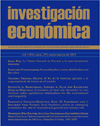REAL BUSINESS CYCLES IN EMERGING ECONOMIES: THE ROLE OF INTERNATIONAL GROWTH AND INTEREST RATE
Main Article Content
Abstract
This paper is aimed at developing a business-cycle model for a small open emerging economy (SOEE). The model is parameterized, calibrated, and simulated to rationalize two important stylized facts in a SOEE. The first one is that when the international interest rate increases, the growth rate of a soee is reduced. Secondly, when industrialized countries are in recession, a soee suffers an even larger reduction in their growth rate. The obtained results show that if exports respond negatively to the international interest rate or exports are reduced due to an international recession, the aggregated consumption of the domestic economy is substantially more volatile than an economy where exports do not react. Moreover, this paper provides a possible explanation to the puzzle that developing countries suffer a recession not only when industrialized countries are in recession, but also when they are growing too fast.
Article Details
How to Cite
Venegas-Martínez, F., Fernández, R. O., & Vera-Valdés, J. E. (2013). REAL BUSINESS CYCLES IN EMERGING ECONOMIES: THE ROLE OF INTERNATIONAL GROWTH AND INTEREST RATE. Investigación Económica, 71(279). https://doi.org/10.22201/fe.01851667p.2012.279.37330
Citas en Dimensions Service
Authors who publish in this journal agree to the following conditions:
a) The authors retain the copy rights (copyright) and give the journal the right of first publication, with the work also under the Creative Commons Attribution License that allows third parties to use what is published as long as they refer to the author or authors of the article. work and its publication in this journal.
b) The authors are free to make other contractual agreements for the non-exclusive distribution of the article they publish in this journal (such as including it in an institutional collection or publishing it in a book), provided that they clearly indicate the original publication of the work in this journal.




